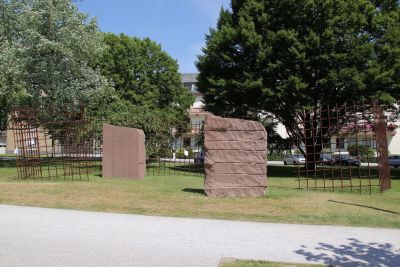Polish letters from the pre and post-war years and from during the war, taking Rhineland-Palatinate as an example
And on 6 July 1941, for example, Górski received this letter from his mother:
“Dear Juleczek!
I received your letter from May today in which you write about work clothes for 9.60 RM [Reichmark]. My Juleczek, it isn’t possible at all for us Poles to buy clothing or material, you can get them with cards but getting cards is very difficult. In the park, decent clothes cost 1000 zł. I am happy that you have bought work clothes at least and when you can, your host will perhaps give you his […] because these are for Germans and Poles who live in the Reich territory. As far as Leszek is concerned, he is not a bad person, as you know, but he doesn't have basic values – his home is wherever he is OK. That’s his nature. Don't be surprised that there were Jews in his family and the egoism emerged in the fourth generation. But let’s leave him in peace, the world also has this type of people. As she gets older, Aunty Cenia is feeling sad that she doesn't have any children because, although they cause their parents to worry, they are also a fulfilment, but not having any in later years is sad. Perhaps God will allow that the Uncle becomes healthy again and that they will be OK again – financially they are not doing too badly. Uncle Niemkiewicz was detained for a long time and aunty hid with her sons in the village and I don't know how it is now because they didn’t […] go for civilians. Lwów is suffering.
Julek, don’t worry about us or about Jędruś. We are healthy, thank God and foreign aircraft have not searched for us at all up to now. Jędruś sent me 50 zl by telegraph again. Julenek don’t worry, you don’t need to send us money or presents, you will bring them with you in person one day. I bought 2 books for you. “Pościg” [Persecution] by Baxter [Frederick Schiller Faust] and “Na kawalerce” [ The Small Bachelor] by Wodehouse. Both are good. Read them and give them to the others. I will send them on 7/7 and I imagine that you will get them in two weeks. Basia has a 2-day exam at the School of Arts. The result will be out on 7/7 at midday. The exam was held in a pretty building.
The first work was a perspective of a box and a chair, the second a sculpture […] of a head, then a head from the imagination made of clay and a written part which Basia and a few others were exempt from because they had finished the course. High above the blackboard, there was an inscription from older pupils “Your fellow artists wish you much success in your exam”. A friendly atmosphere. Basia is such a beautiful girl, she is a bit scared to walk around on her own because she is often approached and she is a little wild one and she doesn’t know how to help herself. There are also boys in this school so she will get used to it.
We send you big kisses Julu
Your Ma[m]
6/7/[1]941”
This letter alone shows just how much these sources reveal about everyday life in occupied Poland, for example what they lacked on a daily basis, which is more surprising when you consider that it was not possible for them to write freely.














